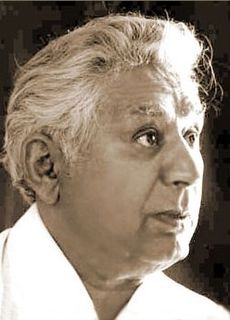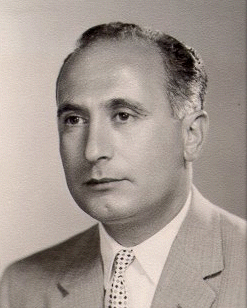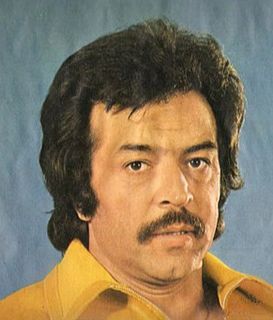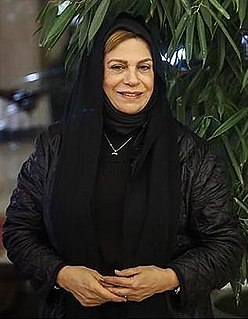Related Research Articles

Bozorg Alavi was an influential Iranian writer, novelist, and political intellectual. He was a founding member of the communist Tudeh Party of Iran in the 1940s and – following the 1953 coup against Premier Mohammad Mossadegh – spent the rest of his life in exile in East Germany, first during the Pahlavi regime, then returning to Germany once more following the 1979 revolution. Cheshm'hā'yash, which was published in Iran in 1952 and was subsequently banned, is considered his finest novel. Alavi was also a very close friend of Iran's famous writer Sadegh Hedayat; these two created a literary group when they were residing in Paris called "sab'e group". Although Her Eyes is considered his masterpiece, Alavi also wrote many other books, such as the novel "Chamedan" (suitcase) which was written under the influence of Freudian psychology. His other novels "Mirza", "Fifty Three Persons" and "Gilemard" are mentioned in Iranian high-school textbooks. He did return to Tehran after the revolution but did not stay too long and decided to head back to Germany. Bozorg Alavi's contribution to Iranian Literature is profound due to the modernization movement in which he was a key member.

Ebrahim Yazdi was an Iranian politician, pharmacist, and diplomat who served as deputy prime minister and minister of foreign affairs in the interim government of Mehdi Bazargan, until his resignation in November 1979, in protest at the Iran hostage crisis. From 1995 until 2017, he headed the Freedom Movement of Iran. Yazdi was also a trained cancer researcher.

Ehsan Yarshater was an Iranian historian and linguist who specialized in Iranology. He was the founder and director of The Center for Iranian Studies, and Hagop Kevorkian Professor Emeritus of Iranian Studies at Columbia University.
Ahmad Ghadakchian, was an Iranian actor. His son, Kamran Ghadakchian, is a director.

Samuel Khachikian was an Iranian film director, screenwriter, author, and film editor of Armenian descent. He was one of the most influential figures of Iranian cinema and was nicknamed "Iran's Hitchcock".

Iraj Ghaderi was an Iranian film director and actor. He briefly studied to become a pharmacist, but soon dropped out. He died in Tehran on 6 May 2012, aged 77.

Parvin Soleimani was an Iranian actress of theater and cinema, who dedicated over 60 years of her life to Iranian art and cinema. She died at the age of 86 in Tehran.

Gholām-Hossein Sā'edi MD was a prolific Iranian writer.
Massoud Mehrabi was an Iranian journalist, writer and caricaturist. He studied cinema at the Faculty of Dramatic Arts of the University of Art (1977–1982). and later passed a Film Production Management course at the Industrial Management Institute (1983–84). Mehrabi started his professional career as a journalist in 1970, writing articles for several papers. From 1982 to 1989, he worked at the economic desk of the Iranian National Television.

Jose Prakash was an Indian actor and singer who worked in Malayalam cinema. He was a singer turned actor who had appeared in more than 300 films mostly in antagonist roles. He was awarded with the J. C. Daniel Award in 2011, a day before he died aged 86. In a career spanning for around 40 years, he is known for portraying some of the iconic villain characters in the Malayalam film industry. Later, he switched to character roles in the mid 90s.

Gohar Kheirandish is an Iranian actress and was born in Neyriz. While studying and working in Tehran, Kheirandish started working in television. Her first film, Days of Waiting, was directed by Asghar Hashemi. She the appeared in Lady, directed by Dariush Mehrjoyi.

Damavand College was founded in 1968 as a private institution of higher learning for women and run by an international community and by American Presbyterian Missionaries. In 1974, it became a public college, offering a four-year intercultural program in liberal arts.

Siavash Kasrai was an Iranian poet, literary critic, and novelist. He is well-known for his epic poem of Arash the Archer written in the late '50s. An active supporter of the Communist Tudeh Party of Iran from the late 1940s to the mid 1980s, he distanced himself from its leadership in 1988–1990, and turned into an outspoken critic in the mid 1990s.
Marxist Mojahedin were a faction within the People's Mujahedin of Iran (MEK) that emerged in 1975, after members associated with it declared that they no longer self-identify as Muslims but rather only believe in Marxism–Leninism. They subsequently started an intragroup conflict with other MEK members who refused to join it and tried to purge the group in order to make it purely Marxist.

Socialism inIran or Iranian socialism is a political ideology that traces its beginnings to the 20th century and encompasses various political parties in the country. Iran experienced a short Third World Socialism period at the zenith of the Tudeh Party after the abdication of Reza Shah and his replacement by his son, Mohammad Reza Pahlavi. After failing to reach power, this form of third world socialism was replaced by Mosaddegh's populist, non-aligned Iranian nationalism of the National Front party as the main anti-monarchy force in Iran, reaching power (1949–1953), and it remained with that strength even in opposition until the rise of Islamism and the Iranian Revolution. The Tudehs have moved towards basic socialist communism since then.

On 3 August 1979, Constitutional Convention election was held in Tehran Province constituency with plurality-at-large voting format in order to decide ten seats for the Assembly for the Final Review of the Constitution
The Septuple Coalition was the electoral alliance of seven communist political groups contesting in the 1979 Iranian Constitutional Convention election with the stated objective of "exposé". The alliance also endorsed candidates of the Organization of Iranian People's Fedai Guerrillas –which was not part of the coalition– despite the differences between them.
The Grand National Alliance was a secular electoral alliance contesting in the 1979 Iranian Constitutional Convention election. The candidates listed by this coalition mostly included communists and nationalists.
The United Campaign for Fulfillment of the Working Class Aspirations, more commonly known as Arman, was a small communist party in Iran. This organization was led by Javad Qaedi and ideologically close to thinking of Taghi Shahram.
References
- ↑ Hassaniyan, Allan (2021), Kurdish Politics in Iran, Cambridge University Press, p. 4, doi:10.1017/9781009029971, ISBN 9781009029971, S2CID 241171409
- ↑ Dunn, Andrew (5 February 2016), "Nashriyah: digital Iranian historic newspapers", Social Sciences Librarians’ Blog